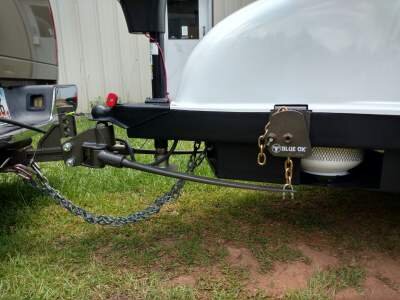The chart is a very useful tool. Its not perfect, but it gives you a place to start your thinking process. A lot of factors come into play when you are looking for success in towing. The tow vehicle, the weight distribution hitch, and the trailer itself.
Travel trailers are unique as they are not like cargo trailers and car haulers. You must understand the balance of the trailer to yield a proper tongue weight. Its all a numbers game.
Some trailers tow wonderfully at low percentages of tongue weight, while others require much more. Simple things like tire inflation and type of tire (tow vehicle) can make or break a successful and enjoyable tow. Its not just one thing, its everything.
My trailer towed wonderfully when it was totally empty when I bought it. it had never been equipped with a weight distribution hitch previously. I loaded it up and went to take a trip and it was a nervous tow. About half way to the State Park (Cloudland Canyon, GA, wonderful place) I considered stopping and draining the fresh water tank (in the rear). On the way home, I did empty the FW tank before I pulled out of the campsite, and yes, it made a difference, but still was not what I was looking for. After installing the Blue Ox Sway Pro hitch, I saw serious improvement in the tow but again, still wasn't right. I did ONE thing, and that fixed it. I had a plastic container in the rear storage with a 40ft 12 gauge extension cord, the 36ft 30amp shore cord for the trailer, and several different dogbones. I moved that one container to the front cargo pod, and now the trailer tows perfectly. I left the containers with the water hose and accessories, and the sewer hose and adapters and the awning rod and stabilizer hand crank in the back. I don't put anything else in there. I did have a tongue weight of about 800 lbs (weighed on CAT scales) but suspect that I am at about 850lbs now. This is a 7500 lb gross trailer that usually is about 6500 lbs. (need to go to the scales again).
Edit: before someone says something about the chains being twisted, I have recently welded (professional welder, older than me) new chain attach points to the outside of the tongue and the chains are now shorter and only crossed. Please don't twist chains to shorten them, it lowers the breaking strength tremendously. It took me a while to learn.
Charles

